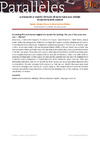Identificador persistente para citar o vincular este elemento:
https://accedacris.ulpgc.es/jspui/handle/10553/77135
| Campo DC | Valor | idioma |
|---|---|---|
| dc.contributor.author | Méndez Silvosa, Natalia | en_US |
| dc.contributor.author | Bolaños Medina, Alicia | en_US |
| dc.date.accessioned | 2021-01-13T16:31:47Z | - |
| dc.date.available | 2021-01-13T16:31:47Z | - |
| dc.date.issued | 2019 | en_US |
| dc.identifier.issn | 2296-6684 | en_US |
| dc.identifier.uri | https://accedacris.ulpgc.es/handle/10553/77135 | - |
| dc.description.abstract | Nowadays, a substantial majority of series and movies comes from the United States, whose social reality has always been linked to the fight for freedom and the elimination of racism. These themes have often been depicted in audiovisual products. The African-American population has its own dialect: African American English (AAE). Although black people have long been present in films and television, AAE has only been realistically used in audiovisual media in the last few years. These characters pose a challenge to translators, and their growing presence in audiovisual products requires further analysis of this topic, which currently lacks an extensive bibliography. In this paper, we analyse the original text and Spanish dubbing from a selected corpus comprised of several episodes of the American series Insecure. After classifying the distinctive features of the AAE by their nature, we study how these characteristics are translated. We also compare both versions so that we can identify the most prominent translation strategies and techniques in each category. This analysis aims to determine if there has been any effort to reproduce AAE in the Spanish dubbing or if, on the contrary, it has been completely eliminated. | en_US |
| dc.language | spa | en_US |
| dc.relation.ispartof | Parallèles | en_US |
| dc.source | Paralléles [ISSN 2296-6684], v. 31 (2), p. 32-48, 2019 | en_US |
| dc.subject | 5701 Lingüística aplicada | en_US |
| dc.subject | 570112 Traducción | en_US |
| dc.subject.other | Audiovisual translation | en_US |
| dc.subject.other | Dubbing | en_US |
| dc.subject.other | African American English | en_US |
| dc.subject.other | Language variation | en_US |
| dc.title | La traducción al español del inglés afroamericano para doblaje: el caso de la serie Insecure | en_US |
| dc.type | info:eu-repo/semantics/article | en_US |
| dc.type | Article | en_US |
| dc.description.lastpage | 48 | en_US |
| dc.description.firstpage | 32 | en_US |
| dc.relation.volume | 31-2 | en_US |
| dc.investigacion | Artes y Humanidades | en_US |
| dc.type2 | Artículo | en_US |
| dc.description.numberofpages | 16 | en_US |
| dc.utils.revision | Sí | en_US |
| dc.date.coverdate | Octubre 2019 | en_US |
| dc.identifier.ulpgc | Sí | en_US |
| dc.contributor.buulpgc | BU-HUM | en_US |
| dc.description.sjr | 0,29 | |
| dc.description.sjrq | Q3 | |
| dc.description.esci | ESCI | |
| item.fulltext | Con texto completo | - |
| item.grantfulltext | open | - |
| crisitem.author.dept | GIR IDETIC: División de Traducción e Interpretación y Aprendizaje de Lenguas | - |
| crisitem.author.dept | IU para el Desarrollo Tecnológico y la Innovación en Comunicaciones (IDeTIC) | - |
| crisitem.author.dept | Departamento de Filología Moderna, Traducción e Interpretación | - |
| crisitem.author.orcid | 0000-0002-2984-3883 | - |
| crisitem.author.orcid | 0000-0001-5956-0166 | - |
| crisitem.author.parentorg | IU para el Desarrollo Tecnológico y la Innovación en Comunicaciones (IDeTIC) | - |
| crisitem.author.fullName | Méndez Silvosa, Natalia | - |
| crisitem.author.fullName | Bolaños Medina, Alicia Karina | - |
| Colección: | Artículos | |
Visitas 1
205
actualizado el 10-ene-2026
Descargas
91
actualizado el 10-ene-2026
Google ScholarTM
Verifica
Comparte
Exporta metadatos
Los elementos en ULPGC accedaCRIS están protegidos por derechos de autor con todos los derechos reservados, a menos que se indique lo contrario.
